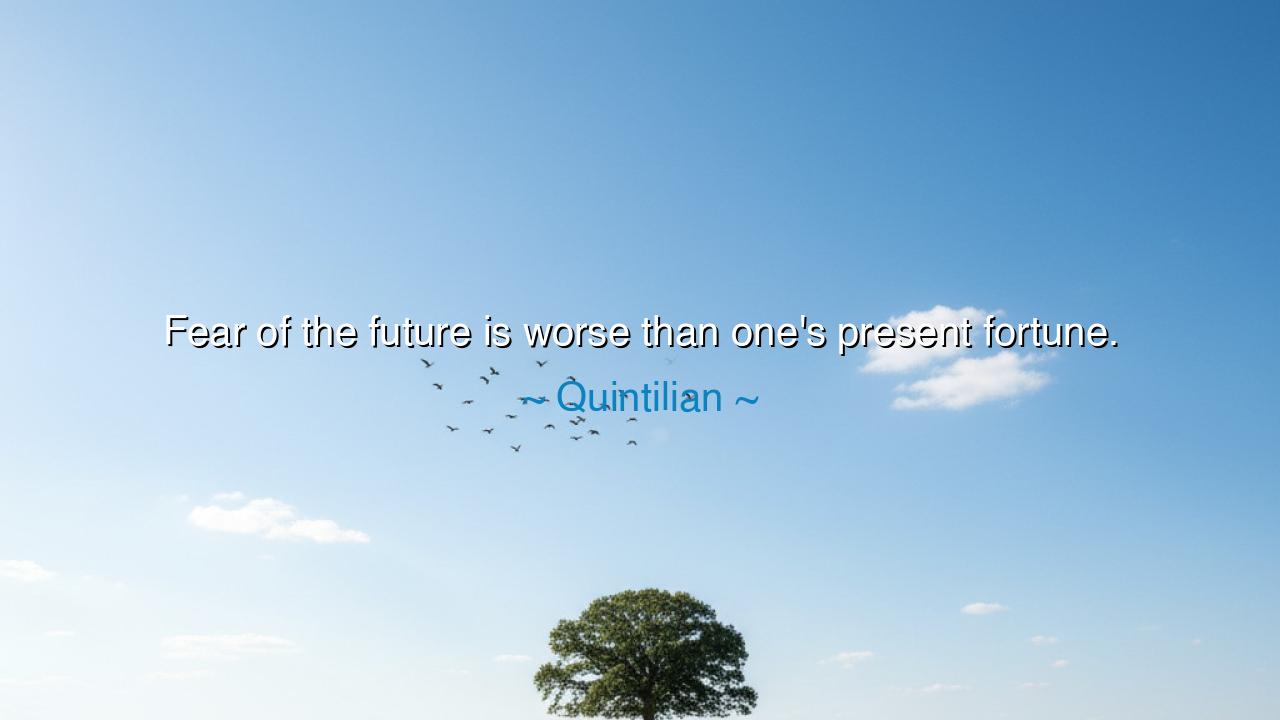
Fear of the future is worse than one's present fortune.






"Fear of the future is worse than one's present fortune." These words by Quintilian, the renowned Roman orator and educator, resonate with a truth that transcends time. In the ancient world, as it is in the world today, there exists a common human affliction—the fear of what lies ahead. Quintilian understood that the unknown nature of the future often overwhelms the present moment, causing us to suffer more from our anxieties about what might happen than from the realities of our current situation. To live in fear of the future is to deny the power of the present, where our actions, our choices, and our growth are grounded.
In the teachings of the Stoics, such as Epictetus and Seneca, we find a similar reflection on the folly of worrying about what is beyond our control. The Stoics emphasized that we should focus not on the uncertainty of the future but on the virtue and wisdom we can cultivate today. Seneca warned that a life spent consumed with fear of the future would not only waste our time but would also diminish our capacity to enjoy the present, which is the only real moment we have. For the Stoics, the only time that matters is now—the present, where we can act with integrity and purpose. Their wisdom aligns perfectly with Quintilian’s assertion that the fear of tomorrow is more painful than the realities of today.
The fear of the future is often born from imagination—a mental construct of events that may never come to pass. Consider the story of Cassandra, the Trojan princess cursed with the gift of prophecy. While she foresaw the fall of Troy, her warnings were met with disbelief, and the future she dreaded came to fruition. But in her foreknowledge, she was also trapped by a constant anticipation of doom. She could not enjoy the present or act in a way that might have changed her future because she was consumed with the fear of it. Quintilian’s quote reminds us that dwelling on imagined futures—whether filled with doom, failure, or loss—often causes more suffering than the actual events themselves.
In history, we see this truth played out in the lives of many great figures. Alexander the Great, whose ambition drove him to conquer vast lands, spent much of his life looking toward the future, imagining the greatness of his empire, and fearing what might go wrong. Yet, in his final days, Alexander realized that his relentless pursuit of a future that was never fully in his control led to his untimely death, and in his moment of fear about what would become of his empire, he failed to truly appreciate the greatness he had already achieved. Alexander’s story is a lesson in how living in constant fear of the future can blind us to the glory and blessings of the present.
Quintilian’s wisdom is also reflected in the parable of the farmer in ancient philosophy. The farmer, who spends his days tending to his crops and his livestock, does not waste time worrying about an uncertain future. He lives day by day, focusing on what he can control—his work and his effort—knowing that the future will unfold as it must. The farmer does not ignore the future; he simply does not allow it to dominate his thoughts. This story teaches us that action in the present, the work we do today, is what shapes the future. The fear of the future, however, paralyzes us, preventing us from moving forward with confidence.
The lesson here is clear: fear of the future is the greatest obstacle to peace in the present. While it is natural to plan and think ahead, when we allow our fear of the unknown to consume us, we lose sight of the potential that lies in each moment. The key to living a fulfilling life is to act with courage and purpose in the present, to embrace the opportunities and challenges before us without being paralyzed by fear. Quintilian calls us to focus not on what might happen tomorrow, but on how we can live with integrity and wisdom today.
In our own lives, let us take this ancient wisdom to heart. Fear is often an illusion, a product of our own imaginations. By shifting our focus away from the unknown and toward the present moment, we can find clarity and strength. Instead of worrying about the uncertain future, let us dedicate ourselves to living fully in the now, making decisions that align with our values, and embracing each step we take. The future will come as it will, but it is our actions today that will shape it. Let us not waste this precious moment in fear, but live with the courage to shape the life we wish to lead.






AAdministratorAdministrator
Welcome, honored guests. Please leave a comment, we will respond soon